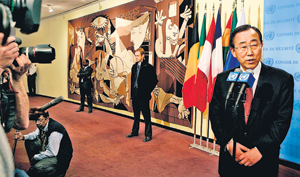
| To hang or not to hang: Saddam’s death stirs debate on capital punishment NEW YORK - Every newly-anointed Secretary-General is entitled to a political honeymoon with the news media — a period during which he is spared the venomous vitriolic of perpetually griping reporters in the UN press corps. But the new UN chief Ban Ki-moon's honeymoon ended on the very first day in office when he walked into a raging controversy over the death penalty and the execution of Saddam Hussein.
Virtually every major news organisation in the US — perhaps with the exception of right wing neo conservative publications such as the Wall Street Journal — pounced on him for ducking a question and refusing to say whether he was for or against capital punishment. Ban's refusal to speak against it — perhaps because he comes from South Korea, one of the world's few democracies backing the death penalty — stood in stark contrast to his predecessor Kofi Annan who never minced his words on the subject of capital punishment. "The issue of capital punishment is for each and every member state to decide," Ban told reporters, holding his beliefs close to his chest. When a reporter fired a second question asking for his views on Italy's call for a universal moratorium on the death penalty, he parroted the same answer. But he did add: "At the same time, I would hope that the international member states would pay due regard to all aspects of international humanitarian laws." Annan, who stepped down as secretary-general on Dec 31, publicly opposed the death penalty. On principle, he was also opposed to the verdict of execution imposed on Saddam Hussein by the Iraqi courts last month, although he condemned the crimes committed by the Iraqi dictator. "The forfeiture of life is too absolute, too irreversible, for one human being to inflict it on another, even when backed by legal process,'' Annan said. "Let the states that still use the death penalty stay their hand, lest in time to come they look back with remorse, knowing it is too late to redeem their grievous mistake," he pronounced. Ban is entitled to his own views on the death penalty — just as Annan was — for the simple reason that the 192-member General Assembly has not taken a decision on capital punishment because it is split right down the middle. But what irked most reporters is that he remained ambiguous — living up to his reputation of "a slippery eel," a sobriquet he earned from the news media in his home capital Seoul. Worse still, both his Special Representative for Iraq Ashraf Qazi and his High Commissioner for Human Rights Louise Arbour were unequivocal in their opposition to capital punishment. Qazi issued a statement last Sunday, hours after Saddam Hussein's hanging, that "the United Nations stands firmly against impunity, and understands the desire for justice felt by the many Iraqis." However, Qazi asserted, the "United Nations remains opposed to capital punishment, even in the case of war crimes, crimes against humanity and genocide." Asked whether Qazi's comments differed from that of Ban, UN spokeswoman Michele Montas tried to calm the troubled waters when she told reporters the secretary-general's reference to international humanitarian law "tacitly referred to how the United Nations and the UN Human Rights Council do not recognize capital punishment." Arbour, however, pointed out that international law, as it currently stands, only allows the imposition of the death penalty as an exceptional measure within rigorous legal constraints. She was also opposed to Hussein's hanging. Meanwhile, writing in the website CounterPunch, the London-based leftwing activist Tariq Ali says the fact that Saddam Hussein was a tyrant is beyond dispute. "But what is conveniently forgotten is that most of his crimes were committed when he was a staunch ally of those who now occupy the country." It was, as he admitted in one of his trial outbursts, the approval of Washington (and the poison gas supplied by the former West Germany) that gave him the confidence to douse Halabja with chemicals in the midst of the Iran-Iraq war, he writes. "He deserved a proper trial and punishment in an independent Iraq. Not this. The double standards applied by the West never cease to astonish. Indonesia's Suharto who presided over a mountain of corpses (at least a million to accept the lowest figure) was protected by Washington. He never annoyed them as much as Saddam." And what of those who have created the mess in Iraq today?, asks Ali."The torturers of (Iraqi prisoners in) Abu Ghraib; the pitiless butchers of Fallujah; the ethnic cleansers of Baghdad, the Kurdish prison boss who boasts that his model is Guantanamo?." "Will (U.S. President George W.) Bush and (British Prime Minister Tony) Blair ever be tried for war crimes?" |
|| Front
Page | News | Editorial | Columns | Sports | Plus | Financial
Times | International | Mirror | TV
Times | Funday
Times || |
| |
Copyright
2006 Wijeya
Newspapers Ltd.Colombo. Sri Lanka. |
